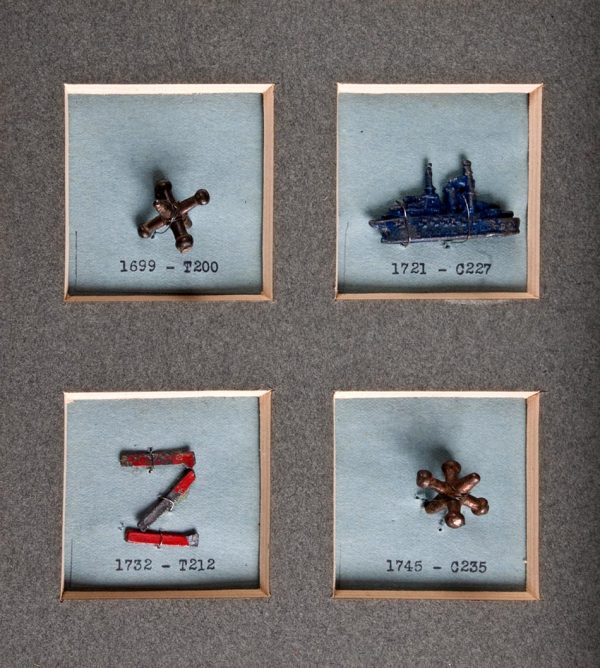
Poetry Inspired by the Chevalier Jackson Foreign Body Collection of the College of Physicians of Philadelphia
The Foreign Body Collection has acted upon the imaginations of numerous poets, some of whom have shared their work with me. Filmmaker Kevin DiNovis sent me a poem after learning about Swallow, as did Andrea O.K. Wright. (Two decades ago, Andrea Wright worked as part-time receptionist/gallery attendant at the Mütter Museum, during which time she was given the task of examining and writing a condition report for every object in the Chevalier Jackson collection.) Kate Shapira produced a chapbook (Case Fbdy.) based on discarded Xerox copies from Jackson’s Diseases of the Air and Food Passages of Foreign Body Origin that she happened upon in the copy room at the University of Rhode Island where I had left them. At Ursinus College, students in poet and Professor M. Nzadi Keita’s class were encouraged to write about the foreign body exhibit to coincide with my visit to campus. The poetry that these students produced was nothing short of astonishing, and it was a wonderful experience to listen to the places these writers let the foreign bodies take them. The students presented an unforgettable reading following my presentation–overlooked by an image of Chevalier Jackson projected on a wall in the art museum. We weren’t sure Jackson would have approved of the license being taken with his “things,” and we were pretty certain he could not have predicted the effects of his collection on human consciousness years hence. Many of the above-mentioned poets have given me permission to share their poems here including Julia Ramsey, a URI undergrad and recent alum, who, while enrolled in a poetry seminar with me at URI, by sheer coincidence wrote a magnificent poem about a case I also happened to be treating in Swallow:
Arboreal Man
by Julia Ramsey, URI Class of 2010
Artyom Sidorkin, twenty-eight,
presented with chest pain,
bloody sputum and shortness
of breath; he did not know
what was happening to him,
but was told a tumor had sunk
deep into the chambers
of his lungs. But, after the cut,
surgeons yanked from Artyom’s chest
a fir tree, two inches tall, healthy
and many-needled
and the exact shade of vast sienna
forest, mirrored in miniature against
blued lung-flesh. A miracle —
that plant could take hold
in flesh, essaying roots
down into a bed not of soil
but of body.
The synthesis of flesh and root
is not a new story. The nymph Daphne,
pursued by Apollo, took
refuge in bark, becoming a laurel. Her father
saved her from the nosing of the archpoet’s
hounds, rooting her feet
in riverbank’s damp shine.
There is something in our core
that covets the stately,
measured turn of tree-cycle,
the pith of the willow,
the elegance of the oak.
The circulatory system elongated
out looks like a tree
itself — the feathery red
venules and capillaries,
each frond speaking
the form of upreaching branch.
How must Daphne have felt,
as the bark crept up her nose,
her arabesqued feet rooting
solid into the ground?
I wonder if Artyom, lying
in his Moscow hospital bed, misses
the knowledge of needle-rustle,
the sprout uncoiling implacable
behind his solar plexus;
pregnant knowledge, in the darkness,
of roots moving like block
and tackle under his skin,
the blood blossoming
in his throat like small,
insistent twigs.
Two Poems from Case Fbdy.,
by Kate Schapira (Rope-a-Dope Press, 2009)
Inflammatory
Any motion that excites the foreign
any unrestricted motion. Full breath,
woman reaching for a handle. Proscribed. Throat
a stinging liquid. Muscle binds, thickened and roughened
by corrosion. Keep her sick. Herself. Keep
her safe. Set against what’s become a part is tissue
any wonder. Incidental signals from the middle
lobe might kindle rust, a rise. Iron your future.
Lie down on it, your own making straps you
around, you swell against it, safely.
Girl aged eight years
Old enough to swallow herself
girls seem to be prone
with heads downward. Attention
transfixes across the lumen
her obligations. Chores.
Like on Little House
on the Prairie Sundays
no work as possible
as folded stillness.
Staring. Aged. Enough.
Cure. Inhale one every
year for the rest of your
life. See how you’ve grown.
Dr. Jackson’s Collection
Kevin DiNovis
These choking things, here boxed and conquered,
bear explanatory epitaphs. One
permits a tin-toy traitor’s bayonet
its boast: I, Victor of a Vanquished Throat.
Another faded label lends its voice
to rust-encrusted safety pins, last lipped
(bad habit) by some distracted Main Line
nanny. This bite of undigested steak
avers by placard the ‘preventative
import of vigorous mastication,’
while, whisker-thin, fine bones of bass
rebut such naïve certainty. Each choking
thing asserts itself a boxer, conquerer,
and so submits (collected: cataloged)
to speech, without which each remains
mute catalyst for that which speech permits.
“A Sketch of Dr. Jackson’s Forceps”
Andrea O.K. Wright
Dr. Jackson’s forceps
can close a safety pin
lodged in a throat.
It shuts menacing jaws,
secures metal muzzles,
and renders glistening fangs
harmless.
When I daydream,
I like to picture
my demon’s snarling sneer
being blunted like that.
Truth or Dare
Dare: Take off your clothes.
I drop my pants first. Quickly they fall
Strangling my skinny ankles. I rip off my black jock bra
Truth: I’m naked.
Exposed. In the buff, birthday suit that God gave me.
Pale flesh. It’s out there. It’s all out there.
Dare: Lie down.
I obey, say ok. Take his order and ask
“Would you like fries with that?”
Everything, white, sterile.
Oceans drape over chest, abdomen, groin, legs and feet
Truth: I’m awake.
I can see everything, hear everything, feel everything.
My heart on the screens. Needle in vein.
Oxygen invades nostrils. Every inhale,
Every exhale, I’m conscious. Alert. Wide awake.
Dare: Let them tie you down.
I don’t resist because I’m tired
Of this battle and I will be their hostage
If it means that together, we can win.
Team. Surgeons on offense. Nurses on defense.
Anesthesiologist on deck.
Truth: I’m the ball.
Dare: Let them sneak wires into you.
Allow metal to pierce through femoral veins.
Let them weave through vessels where
Your blood flows hot. Feel cold
Feel exposed. Feel helpless, hopeless, hapless.
Truth: They are igniting the atrioventricular node.
Adrenaline thrashing through my insides in a fit of terror.
Dare: Let them burn the badness out.
Feel the heat scorch, scold your pain away.
Let it dissolve the years.
Let them poke and prod.
You’re used to it.
Hear the machines alarming,
Beeping, mocking, squawking.
Hear the lead athlete cursing. But don’t you curse.
Be still. Be quiet. Listen. Listen to the rhythm
Of your heart that won’t run away from you anymore.
Feel them resetting your metronome.
Offer the elephant on your chest a peanut.
— Anna Lorine
An art form: not creepy if it’s mutual
For my first sub
That pair of plastic kids’ cop-out handcuffs
With its trick-release
And its misshapen links
Needed your wrists in it
But I see steel and padlocks and leather lining
Because you deserve better
Around your wrists and ankles
With a wide-brim devotion-necklace
A torque constructed of trust and D-rings
Hanging in the hollow of your collarbone
And suddenly the mass-produced plastic toys
Are red rope, drawn taut in shibari diamonds down your chest
To emphasize the elegant space between your waist and throat
But instead I mention the plastic handcuffs
With an offhand gesture of later
Afraid to capture you as an artist might
Afraid of opening me
Of offering you that release of self
Of binding myself in your eyes
© Alex Harwood
BREAD
That day
Grandmother said,
(fussing over the stray hair in my face)
‘eat, eat!’
or waste away just like her baby sisters & brothers
after Great-Grandmother Savage died,
or just like the sisters & brothers who grew up to
hem prom dresses
& work hot steel noodles.
‘How could we know the Japanese
would come in with better industry?,’
she asked me,
a solemn eight year old.
I had no opinion on the matter
& instead asked her,
‘What are we making?’
‘Bread!,’ she huffed out hugely
as though she were emptying
her lungs of flour.
‘Don’t change the subject.’
She showed me how we must wake
the yeast with warm water,
how to submerge our hands
into a breathing mass of oil, wheat & bacteria
& how to let it rest.
She said,
Irish women could make dinners from
potatoes, onions & cabbage
(‘because that is what we had’)
but to bake bread
was to speculate.
‘Bread is alive;
it only seems simple.’
She would knead too long
or use the wrong proportions
& her family would have
nothing for the week.
‘Look at the way the yeast breathes
& the bread grows.’
My Grandmother is growing senile.
She forgets what she ordered for dinner
& which of her daughters
sent her the bouquet on Mother’s Day.
We plead hungrily with her to retell
stories from her hard life –
dropping out of school, the Depression, a few divorces.
She always says,
‘Such nonsense!’
We bring her unearthed artifacts –
a pinochle deck, a coat, a photograph.
We ask her how much olive oil or
what temperature is best for yeast
or how long should we knead?
& she sits
& breathes.
— Alexis Murauskas
Religion, Self-righteousness, and Indigestion
That question I can’t ignore, can’t ignore
My answer crawling, my answer crawling
across dry tongue, crossbar nicks gums
and three-fourths relief crown of thorns
scratches throat as it scrapes past.
I ask, I ask, and I swallow
Scarring skeletal muscle, pewter grooves
through esophageal tube and drops
into acidic digestion pool,
where tarnished pewter corpus burns,
the message etched
across metal crosspiece illegible.
I have my answer.
The question: If God is just, how can he forgive you?
(Justice does not forgive.)
“Behold, the one who claimed
to be king of the Jews,” a weight like a rock
in the stomach to be turned,
carried over and kept
so I won’t forget that it’s there.
Wrong answer.
— James Harper
“Crossed Faith”
I.
Mother never spoke of Peter,
in those lost long nights of cold winter.
She sat in front of his picture,
clenching her savior,
that voiceless crucifix, to her fractured heart.
Down wrinkled cheeks,
freckled with whispers of old age,
it swings from its sparking chain,
silencing once fluent words,
those memorized passages from
an age-old book, lay flat on a dry tongue
Stifled by sorrow.
The taste of petal-pink pearls
pass swiftly over quivering lips.
Mother could not speak of her
beliefs of beauty,
Of love.
Of loss.
Instead, they were written in the tear tracks
swirling from bruised brown eyes,
that gazed upon her lost son.
II.
From thick lipped worshipers and fumbling fingers,
Some search relentlessly for acceptance, while
stroking those smooth familiar angles.
Soon they will sing,
their voices flowing with a haunting melody
of aching pleasure, of sorrow.
For now, they only offer simplicities,
whispered words of hope and desperation
tangled in rosary beads, griped in the hands
of mothers.
Fathers.
And weeping daughters.
They gaze upon his lifeless body
gently enveloped in his wooden casket.
Faces, half hidden by light
show where a tilted “x” marks the spot.
— Ananda Holton
A pigeon
On the ledge out
my window
there is a pigeon
whose spent-charcoal gray
shimmers
with an incandescent
green
pollution sheen.
It cracks into
a kaleidoscope
of dusty wings unfurled.
My eyes; pinched open
and pigeon jittery glaze.
The pigeon must see
my desk collaged with notes,
the floor’s funky amorous rug —
Bright and taut with attention
the pigeon bobs at me;
I reciprocate.
Around the pigeon
the sun seeps into
the fragmented
window. It leaves the glass
translucent and glowing.
— Shane English
